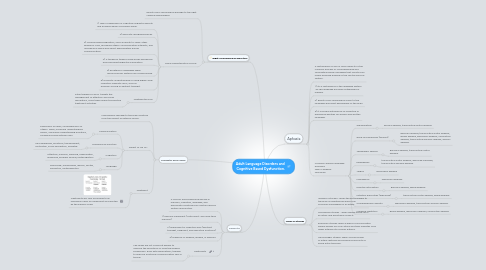
1. Right-Hemisphere Dysfunction
1.1. Results from neurological damage to the right cerebral hemosphere.
1.2. Some characteristics of RHD
1.2.1. 1) Lake of awareness of cognitive-linguistic deficits and possible denial of problem areas.
1.2.2. 2) difficulty recognizing faces.
1.2.3. 3) compromised pragmatics, such as ability to "read" other peoples's cues, recognize others' communication interests, and use physical space and affect appropriately during communication.
1.2.4. 4) A tendency toward using wordy expression and providing tangential information.
1.2.5. 5) dysathria or dysphagia when neuromuscular systems are compromised.
1.2.6. 6) Difficulty understanding or using higher-level cognitive-linguistic skills, such as problem solving or abstract thought.
1.2.7. Treatmentof RHD
1.2.7.1. Initial therapy for RHD targets the management of attention and visual disruptions, since these impact productive treatment activities.
2. Traumatic Brain Injury
2.1. Neurological damage to the brain resulting from the impact of external forces.
2.2. Impact of TBI on :
2.2.1. Communication
2.2.1.1. Expression of ideas, comprehension of others' ideas, using and understanding humor, using and understanding emotions, following conversational rules
2.2.2. Psychosocial Function
2.2.2.1. Self-awareness, Emotions, temperament, motivation, social perception, empathy
2.2.3. Cognition
2.2.3.1. Attention, memory, planning, organization, reasoning, problem solving, metacognition
2.2.4. Language
2.2.4.1. Phonology, morphology, lexicon, syntax, semantics, metalinguistics.
2.3. Treatment
2.3.1. Treatments will vary according to an individual's level of impairment as reflected by the Rancho Scale
3. Dementia
3.1. A chronic and progressive decline in memory, cognition, language, and personality resulting from central nervous system dysfunction.
3.2. 1) memory inpairment ( both short- and long-term memory)
3.3. 2) impairment in cognitive skills (abstract thought, judgment, and executive functions)
3.4. 3) presence of aphasia, apraxia, or agnosia.
3.5. Treatmants
3.5.1. The drugs are not cures but appear to improve the symptoms or slow the disease progresson. Even with medications, therapy to improve functional communication skils is typical.
4. Types of strokes
4.1. Ischemic srtockes : when the blood supply to the brain is inhibited because of an occlusion somewhere in an artery.
4.2. Thrombosis strokes : when plaque builds up in an artery and eventually closes it.
4.3. Embolism strokes: when a piece of accumulated plaque breaks off of an artery and then migrates from larger arteries into smaller artieres.
4.4. Hemorrhagic strokes: when a blood vessel or artery reptures and excessive amounts of blood enter the brain.
5. Aphasia
5.1. A disturbance of one or more aspects of the comples process of comprehending and formulating verbal messages that results from newly acquired disease of the central nervous system.
5.2. 1) It's a disturbance in the language system AFTER language has been established or learned.
5.3. 2) Results from neurological injury to the language-dominant hemisphere of the brain.
5.4. 3) It includes disturbance of receptive or expressive abilities for spoken and written language.
5.5. Common speech-language problems seen in aphasia synromes:
5.5.1. Agrammatism
5.5.1.1. Broca's aphasia, transcortical motor aphasia.
5.5.2. word-find problems (anomia)
5.5.2.1. Baroca's aphasia, transcortical motor aphasia, global aphasia, wernicke's aphasia, conduction aphasia, transcortical sensory aphasia, anomic aphasia.
5.5.3. Telegraphic speech
5.5.3.1. Baroca's aphasia, transcortical motor aphasia.
5.5.4. paraphasias
5.5.4.1. transcortical motor aphasia, wernicke's aphasia, transcortical sensory aphasia.
5.5.5. Jargon
5.5.5.1. Wernicke's aphasia
5.5.6. Neologisms
5.5.6.1. Wernicke's aphasia
5.5.7. Effortful articulation
5.5.7.1. Baroca's aphasia, global aphasia.
5.5.8. Initiation difficulties (adynamia)
5.5.8.1. transcortical motor aphasia, global aphasia.
5.5.9. Comprehension deficits
5.5.9.1. wernicke's aphasia, transcortical sensory aphasia.
5.5.10. Impaired repetition
5.5.10.1. global aphasia, wernicke's aphasia, conduction aphasia
